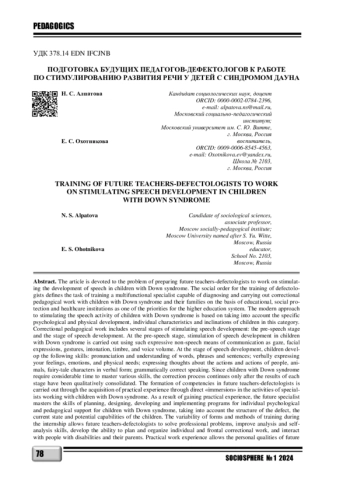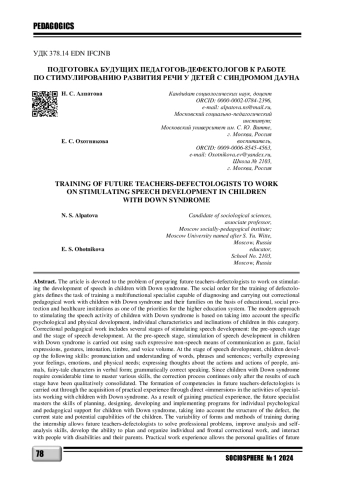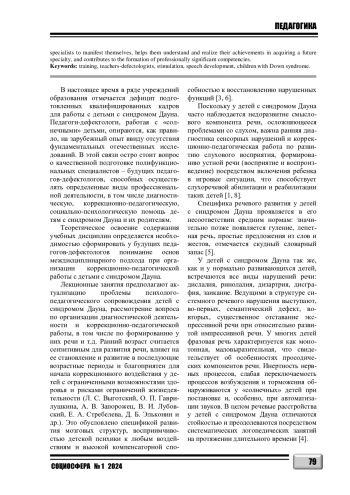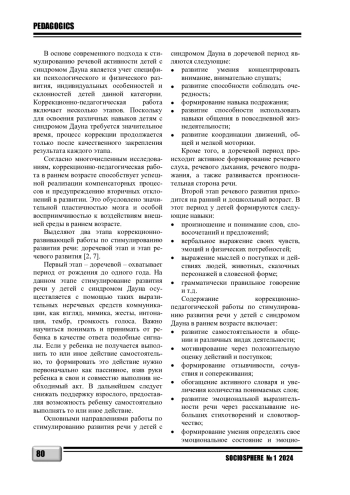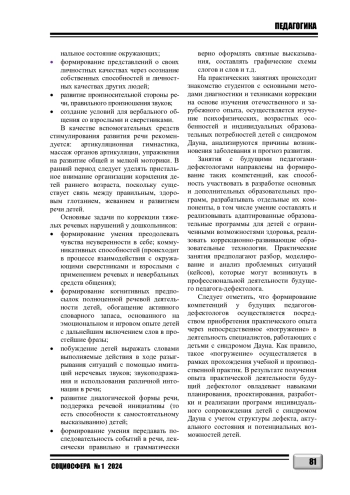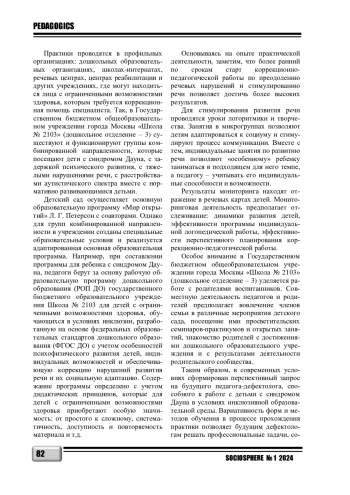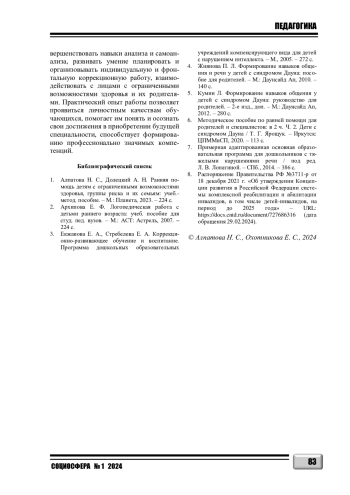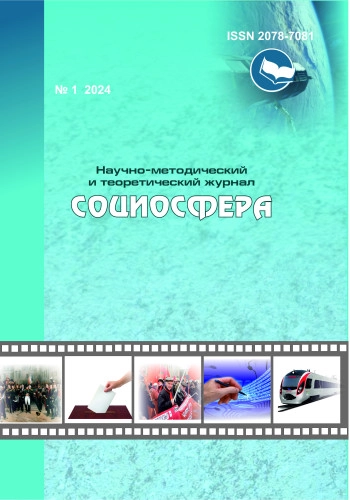Статья посвящена проблеме подготовки будущих педагогов-дефектологов к работе по стимулированию развития речи у детей с синдромом Дауна. Социальный заказ на подготовку дефектологов определяет задачу подготовки многофункционального специалиста, способного проводить диагностику и коррекционно-педагогическую работу с детьми с синдромом Дауна и их семьями на базе учреждений образования, социальной защиты и здравоохранения, как одну из приоритетных для системы высшего образования. Современный подход к стимулированию речевой активности детей с синдромом Дауна основан на учете особенностей психологического и физического развития, индивидуальных особенностей и склонностей детей данной категории. Коррекционно-педагогическая работа включает в себя несколько этапов стимулирования речевого развития: доречевой этап и этап речевого развития. На доречевом этапе стимуляция речевого развития у детей с синдромом Дауна. На этапе речевого развития у детей формируются следующие навыки: произношение и понимание слов, словосочетаний и предложений; устное выражение своих чувств, эмоций и физических потребностей; выражение мыслей о поступках людей, животных, сказочных персонажей в устной форме; грамматически правильная речь. Поскольку детям с синдромом Дауна требуется значительное время для овладения различными навыками, процесс коррекции продолжается только после того, как результаты каждого этапа будут качественно закреплены. Формирование компетенций у будущих педагогов-дефектологов осуществляется через приобретение практического опыта путем непосредственного «погружения» в деятельность специалистов, работающих с детьми с синдромом Дауна. В результате приобретения практического опыта будущий специалист овладевает навыками планирования, проектирования, разработки и реализации программ индивидуального психолого-педагогического сопровождения детей с синдромом Дауна. Вариативность форм и методов обучения во время стажировки позволяет будущим педагогам-дефектологам решать профессиональные задачи, совершенствовать навыки анализа и самоанализа, развивать умение планировать и организовывать индивидуальную и фронтальную коррекционную работу, взаимодействовать с людьми с ограниченными возможностями и их родителями. Практический опыт работы позволяет проявиться личностным качествам будущих специалистов, помогает им понять и реализовать свои достижения в приобретении будущей специальности, а также способствует формированию профессионально значимых компетенций.
The article is devoted to the problem of preparing future teachers-defectologists to work on stimulating the development of speech in children with Down syndrome. The social order for the training of defectologists defines the task of training a multifunctional specialist capable of diagnosing and carrying out correctional pedagogical work with children with Down syndrome and their families on the basis of educational, social protection and healthcare institutions as one of the priorities for the higher education system. The modern approach to stimulating the speech activity of children with Down syndrome is based on taking into account the specific psychological and physical development, individual characteristics and inclinations of children in this category. Correctional pedagogical work includes several stages of stimulating speech development: the pre-speech stage and the stage of speech development. At the pre-speech stage, stimulation of speech development in children with Down syndrome is carried out using such expressive non-speech means of communication as gaze, facial expressions, gestures, intonation, timbre, and voice volume. At the stage of speech development, children develop the following skills: pronunciation and understanding of words, phrases and sentences; verbally expressing your feelings, emotions, and physical needs; expressing thoughts about the actions and actions of people, animals, fairy-tale characters in verbal form; grammatically correct speaking. Since children with Down syndrome require considerable time to master various skills, the correction process continues only after the results of each stage have been qualitatively consolidated. The formation of competencies in future teachers-defectologists is carried out through the acquisition of practical experience through direct «immersion» in the activities of specialists working with children with Down syndrome. As a result of gaining practical experience, the future specialist masters the skills of planning, designing, developing and implementing programs for individual psychological and pedagogical support for children with Down syndrome, taking into account the structure of the defect, the current state and potential capabilities of the children. The variability of forms and methods of training during the internship allows future teachers-defectologists to solve professional problems, improve analysis and self-analysis skills, develop the ability to plan and organize individual and frontal correctional work, and interact with people with disabilities and their parents. Practical work experience allows the personal qualities of future specialists to manifest themselves, helps them understand and realize their achievements in acquiring a future specialty, and contributes to the formation of professionally significant competencies.
Идентификаторы и классификаторы
В настоящее время в ряде учреждений образования отмечается дефицит подготовленных квалифицированных кадров для работы с детьми с синдромом Дауна.
Список литературы
1. Алпатова Н. С., Долецкий А. Н. Ранняя помощь детям с ограниченными возможностями здоровья, группы риска и их семьям: учеб.-метод. пособие. - М.: Планета, 2023. - 224 с. EDN: IAEJUP
2. Архипова Е. Ф. Логопедическая работа с детьми раннего возраста: учеб. пособие для студ. пед. вузов. - М.: АСТ: Астрель, 2007. - 224 с.
3. Екжанова Е. А., Стребелева Е. А. Коррекционно-развивающее обучение и воспитание. Программа дошкольных образовательных учреждений компенсирующего вида для детей с нарушением интеллекта. - М., 2005. - 272 с.
4. Жиянова П. Л. Формирование навыков общения и речи у детей с синдромом Дауна: пособие для родителей. - М.: Даунсайд Ап, 2010. - 140 с.
5. Кумин Л. Формирование навыков общения у детей с синдромом Дауна: руководство для родителей. - 2-е изд., доп. - М.: Даунсайд Ап, 2012. - 280 с.
6. Методическое пособие по ранней помощи для родителей и специалистов: в 2 ч. Ч. 2. Дети с синдромом Дауна / Т. Г. Ярощук. - Иркутск: ЦПММиСП, 2020. - 113 с.
7. Примерная адаптированная основная образовательная программа для дошкольников с тяжелыми нарушениями речи / под ред. Л. В. Лопатиной. - СПб., 2014. - 386 с.
8. Распоряжение Правительства РФ №3711-р от 18 декабря 2021 г. “Об утверждении Концепции развития в Российской Федерации системы комплексной реабилитации и абилитации инвалидов, в том числе детей-инвалидов, на период до 2025 года” - URL: https://docs.cntd.ru/document/727686316_(дата_обращения_29.02.2024).
Выпуск
Другие статьи выпуска
В этой статье исследуется сложная взаимосвязь между политикой и генезисом культурной идентичности этнических меньшинств. Культурная идентичность, включающая общие обычаи, верования, язык и традиции, претерпевает сложную эволюцию под влиянием таких исторических факторов, как миграция, колонизация и маргинализация этнических меньшинств. Политический контекст становится ключевой силой, влияющей на формирование идентичности. Язык, являясь ключевым элементом, отражает политические нюансы, а политика либо укрепляет культурные корни, либо способствует ассимиляции. Политические движения этнических меньшинств становятся испытаниями и подтверждением идентичности, выступая за сохранение культуры. Представительство в политических институтах расширяет возможности меньшинств, способствуя утверждению их идентичности. Глобализация порождает проблемы и возможности, требующие принятия взвешенных политических мер. Дискриминационная политика и дисбаланс власти могут поставить под угрозу сохранение культурной самобытности. Представительство в политических институтах расширяет возможности меньшинств, способствуя утверждению их идентичности. Глобализация порождает проблемы и возможности, требующие принятия взвешенных политических мер. Дискриминационная политика и дисбаланс власти могут поставить под угрозу сохранение культурной самобытности. Признание этих политических аспектов имеет решающее значение для развития инклюзивных обществ, которые ценят разнообразие и уважают права меньшинств.
В статье политический дискурс рассматривается как многомерное и многоплановое явление, как комплекс элементов, образующих единое целое. Затрагиваются проблемы взаимоотношений языка и власти, языка и идеологии, лингвистического манипулирования общественным сознанием.
В статье рассматривается получившее широкое распространение в современной лингвистике понятие “дискурс”, которое является сложным и вариативным в силу своего междисциплинарного характера и отсутствия единого определения. Кроме того, тесная связь этого понятия с целым рядом наук и исследовательских областей, включая компьютерную лингвистику, философию, психологию, социологию, литературоведение, семиотику, теорию и практику перевода, педагогику и т. д., привела к изучению дискурса с различных концептуальных позиций, в зависимости от специфики языка. предмет изучения.
В данной статье анализируется текущее состояние двустороннего экономического сотрудничества с Королевством Саудовская Аравия (КСА) во внешнеполитической стратегии Республики Узбекистан, достижения и проблемы основных направлений развития, таких как торговля и инвестиции. Также в статье обосновывается место и роль отношений Республики Узбекистан с КСА, а также даются предложения и рекомендации по дальнейшему развитию и поддержке отношений в будущем. Автор статьи ставит перед собой задачи аналитического анализа достижений и проблем в межгосударственной торгово-экономической и инвестиционной сферах, а также выявления возможностей для широкого использования богатого опыта КСА для развития отрасли в ближайшем будущем.
В данной статье рассматривается проблема определения и защиты национальных интересов в контексте глобальных экологических вызовов. Автор анализирует основные теоретические подходы к понятию национальных интересов, такие как реализм, либерализм и конструктивизм, и выявляет их сильные и слабые стороны. Особое внимание уделяется реалистической традиции, которая считается доминирующей в изучении международных отношений. Автор критикует реалистическую концепцию национальных интересов, основанную на принципах силы, безопасности и суверенитета, и предлагает альтернативный подход, называемый экологическим реализмом. Экологический реализм предполагает, что национальные интересы должны учитывать не только политические, экономические и военные факторы, но и состояние окружающей среды и последствия действий государств. Автор утверждает, что экологический реализм может предложить более адекватную и ответственную стратегию поведения государств в мире, где экологические риски и последствия действий государств могут быть существенно различны.
В статье рассматривается развитие гендерных отношений и гендерных прав в различных сферах жизни современной Южной Кореи. Большое внимание уделяется отношениям между мужчинами и женщинами и проявлению гендерного неравенства в таких сферах жизни, как семья и брак, а также сфера образования и занятости. Представлено неравное положение мужчин и женщин в различных сферах деятельности. Приведены статистические данные и отчеты из разных источников информации. Представлены новые тенденции, связанные с гендерными проблемами в Южной Корее. В статье даны определения упомянутым тенденциям.
В данной статье рассматривается необходимость оценки организацией уровня социального развития персонала. Анализируются подходы к оценке социального развития персонала строительной компании. В рамках анализа предлагается система показателей для четырех групп: трудовая активность, эргономика рабочего места, оплата труда и рабочая атмосфера.
В данной статье 100 курсантов военного института технологий связи были обследованы по методике М. В. Чумакова “Исследование волевых качеств личности”, а для расчета полученных результатов был использован математико-статистический анализ (t-критерий Стьюдента).
Данная статья посвящена проблеме и решению проблемы высокообразованных кадров в сфере культуры в годы независимости Узбекистана. На основе архивных источников подробно описаны основные причины нехватки высокообразованных кадров и медлительности в деятельности учреждений культуры. Также предлагается несколько вариантов решения кадровой проблемы.
В современных условиях система высшего образования приобретает особое значение среди каналов рекрутирования политических элит. В результате обобщения научной дискуссии выделены организационные, социальные и институциональные аспекты функционирования канала рекрутирования политических элит. Выявлена эволюционная устойчивость канала рекрутирования политических элит из системы высшего образования. Определены особенности элитных зарубежных и элитных отечественных высших учебных заведений. Систематизированы инструменты государственного воздействия на рекрутирование политических элит из российских высших учебных заведений. Определен организационный, социальный и институциональный механизм рекрутирования политических элит из системы высшего образования России.
Анализ публикаций, доступных широкой публике, помогает осветить традиционные вопросы, поднимаемые академическими исследователями, а также отметить новые тенденции и направления. На основе изученного материала авторы делают вывод об актуальных проблемах подготовки специалистов в области профессиональной психологии. В отечественных источниках желательно акцентировать внимание на процессе обучения и оценке профессиональной и личностной готовности к выполнению профессиональной деятельности. Зарубежные источники раскрывают вопросы профессионального развития и негативные последствия участия в сложных операциях, а также вопросы психологической поддержки и ассистирования.
В статье представлены перспективы развития армрестлинга в науке, такие как написание кандидатских и докторских диссертаций в соответствии с паспортами научных специальностей, представленных на кафедре теории и методики физического воспитания ЛГПУ: 5.8.4. Физическая культура и профессиональная физическая подготовка; 5.8.5. Теория и методика спорта. (педагогические науки); 5.8.6. Оздоровительная и адаптивная физическая культура (педагогические науки); перспективы развития армрестлинга в педагогике: разработка различных методик, направленных на формирование и развитие двигательных навыков, воспитание физических качеств, профилактику травматизма, формирование духовно-нравственных качеств и т. д.; перспективы развития армрестлинга в России. развитие армрестлинга в спорте: открытие отделений или секций по армрестлингу в детско-юношеских школах; открытие в общеобразовательных учреждениях секций по армрестлингу; открытие секций по армрестлингу в Высшей школе физической культуры; физкультурно-оздоровительный комплекс.
В статье актуализируется проблема развития навыков словообразования у старших дошкольников с общим недоразвитием речи с помощью дидактических игр. Общее недоразвитие речи (III уровень) характеризуется нарушениями речи, при которых у детей нарушено формирование всех компонентов речевой системы, связанных с ее звуковой и смысловой стороной, при нормальном слухе и интеллекте, что затрудняет процесс обучения и адаптации детей в обществе. Целью исследования явилось теоретическое обоснование и практическая реализация логопедической программы по развитию навыков словообразования у детей старшего дошкольного возраста с общим недоразвитием речи (III уровень) посредством дидактических игр. Данная программа реализовывалась в три этапа: подготовительный, основной и заключительный. На подготовительном этапе программы проводилась работа по развитию речевого слуха, включая интонационный, фонетический и звукоподражательный. На этом этапе активно использовались специально разработанные дидактические игры, направленные на стимулирование слухового восприятия и внимания ребенка. На основном этапе программы дети знакомились с правилами словообразования на основе ориентировочной и исследовательской деятельности. Одним из методов обучения было использование парных сравнений производных и формообразующих слов, сопровождаемых сравнительным анализом этих слов по обозначению. На заключительном этапе программы старшие дошкольники отрабатывали навыки образования производных слов. Работа проводилась с целью закрепления навыков подбора производных слов, основанных на ранее изученных словообразовательных моделях, и развития навыков применения правил словообразования и словоизменения. На этом этапе использовались упражнения и дидактические игры по подбору слов на основе изученных структурных моделей. Данные повторной диагностики позволяют констатировать высокий уровень эффективности реализации логопедической программы по развитию навыков словообразования у детей с общим недоразвитием речи (III уровень).
В статье рассматривается проблема абилитации детей с церебральным параличом. Детский церебральный паралич - это патология, при которой развивается нарушение мышечной иннервации в сочетании с многочисленными сопутствующими симптомами. Отличительной особенностью детского церебрального паралича является наличие сложного комплекса нарушений в двигательной, речевой, психической и социальной сферах, которые сопровождаются сопутствующими симптомами. Целью исследования было теоретическое обоснование, разработка и внедрение программы абилитационной помощи детям с церебральным параличом. Экспериментальная работа проводилась поэтапно и предполагала последовательную стимуляцию развития двигательных, психических и речевых функций. На этапе диагностики изучался уровень развития детей в речевой, двигательной, когнитивной и социальной сферах. Обследование было направлено на выявление текущего уровня развития ребенка и его зоны ближайшего развития. Нарушения в двигательном, когнитивном, речевом и социальном развитии детей раннего возраста с церебральным параличом представляют собой сложный симптомокомплекс, качественно неоднородны и затрудняют социальную адаптацию детей. На активном этапе экспериментальной работы была разработана и внедрена программа абилитационной помощи детям раннего возраста с церебральным параличом, основанная на дифференцированном подходе, направленном на компенсацию имеющихся нарушений у детей и их социальную адаптацию. С целью проверки эффективности программы абилитационной помощи детям с церебральным параличом мы провели контрольно-оценочный этап экспериментальной работы, который позволил выявить положительную динамику уровневых показателей развития по основным направлениям развития детей данной категории. Результаты экспериментальной работы показали, что эффективность абилитационной помощи детям с церебральным параличом достигается при соблюдении ряда условий. Активное участие родителей в процессе абилитации детей является важным условием его эффективности. Добиться положительной динамики в развитии детей с церебральным параличом можно благодаря активной психолого-педагогической поддержке и сопровождению членов семьи, формированию позитивного отношения к ребенку и оказанию ему систематической абилитационной помощи.
В статье рассматриваются некоторые вопросы ресоциализации осужденных, содержащихся в местах лишения свободы, их реинтеграции в общество. Вопросы ресоциализации осужденных и лиц, освободившихся из мест лишения свободы, имеют большое теоретическое и практическое значение. Ресоциализация осужденных, освобожденных из исправительных учреждений, в настоящее время не в полной мере реализуется в отечественной пенитенциарной системе. В связи с этим ставится вопрос о необходимости создания государственной программы постпенитенциарной поддержки осужденных после освобождения. Анализируется понятие “ресоциализация”.
Данная статья посвящена исследованию актуальной проблемы гендерного описания концептов в русскоязычном медиадискурсе. В статье определены ключевые понятия “гендер” и “концепт”. Особое внимание уделено рассмотрению концепта “ЖЕНЩИНА” и его доминирующих фреймов. Проведен анализ различных языковых средств репрезентации данного концепта “ЖЕНЩИНА” в русскоязычном медиадискурсе. Материалами для исследования послужили статьи из российских СМИ о женщинах Исламского Востока.
Признание и осмысление общих ценностей, норм, практик и условностей, которые передавались из поколения в поколение в рамках определенной культуры или цивилизации, имеет важное значение для понимания традиционных ценностей. Историческое, культурное и социальное происхождение сообщества имеет основополагающее значение для традиционных ценностей, которые влияют на то, как люди воспринимают мир, относятся друг к другу и принимают решения. Традиции формируются и видоизменяются под влиянием исторических событий, культурных взаимодействий и изменений в обществе. Необходимо понимание взаимозависимости ценностей, динамики передачи и постоянной адаптации традиций к меняющимся условиям окружающей среды. В этой статье кратко систематизированы взгляды казахстанских ученых на традиционные ценности. Мы пришли к выводу, что систематизация взглядов отечественных ученых на изучение традиционных ценностей необходима для создания структурированного понимания этой сложной и многогранной темы.
В статье представлен онтологический анализ феномена смысла. Смысл исследуется с точки зрения формы его репрезентации в сознании. Констатируется бессмысленный характер значения - значение не обладает пространственностью, временностью и квалиа. Показано, что значение может быть интерпретировано как «потенциальная» форма бытия. Фундаментальным свойством значения также является его единство, внутренняя целостность. Существуют не отдельные семантические единицы, а целостное «семантическое поле», в котором каждый компонент существует только в контексте целого.
В статье рассматривается концепция таланта и управления талантами как один из современных подходов к стратегическому управлению человеческими ресурсами. Освещаются основные практики управления талантами в организациях различных типов. Приведенный выше анализ позволяет нам сделать вывод о том, что российская система государственного управления значительно отстает в распространении и качестве технологий управления талантами. Управление талантами - актуальная тема для современных организаций, причем не только в частном и некоммерческом секторах, но и в государственных структурах, поскольку только лучшие таланты могут обеспечить процветание и устойчивость любой организации. В данной статье рассматриваются основные подходы к понятиям “талант” и “управление талантами”, а также основные проблемы отбора, привлечения, удержания и развития сотрудников с высоким потенциалом на российской государственной службе.
Данная статья посвящена теоретическим основам обучения сотрудников на предприятии, в работе отражены цели и программы обучения, а также выявлены плюсы и минусы системы обучения. Также отражены виды обучения сотрудников на предприятии, информация, представленная в статье, позволяет сформировать общее представление о системе обучения на предприятии. Переход в другие отрасли, внедрение новых технологий и замена зарубежного оборудования на российское требуют регулярного обучения и переподготовки сотрудников. Управление развитием персонала приобретает все большее значение в современных организациях. Это включает в себя не только обучение новым навыкам, но и поддержку непрерывного профессионального развития сотрудников. Традиционно внешние учебные центры, выдающие сертификаты государственного образца, разделяют обучение на несколько видов.
В данной статье рассматривается важность повышения квалификации государственных служащих, подчеркивается необходимость этого аспекта, а также рассматриваются ключевые вопросы аттестации сотрудников на государственной службе. Своевременное повышение квалификации позволяет государственным гражданским служащим совершенствовать свои профессиональные навыки, овладевать новыми знаниями и применять их на практике. Повышение квалификации помогает государственным гражданским служащим быть в курсе последних изменений в законодательстве, применять лучшие практики и учитывать современные тенденции в своей сфере деятельности. Осознание важности профессионального развития государственных служащих приводит к реализации мер, направленных на постоянное обновление и развитие их профессиональных навыков и компетенций.
В данной статье предпринята попытка проанализировать основные проблемы, связанные с проблемой выявления деструктивных рисков глобального экономического развития в контексте постоянного усиления влияния политического субъективного фактора и попыток ряда западных стран оказать давление на систему развития мирового финансового рынка.
В статье представлен анализ использования объекта олимпийского наследия - стадиона “Фишт”. Для проведения данного исследования был проведен анализ посещаемости спортивного сооружения и затрат на его эксплуатацию. Выявлена динамика изменения количества посещений спортивных шоу по состоянию на конец 2023 года. Представлены рекомендации автора, позволяющие использовать уникальные возможности стадиона “Фишт” как для предоставления спортивных услуг, так и для снижения зависимости от федерального бюджета.
Данная статья посвящена цифровизации образования; время требует внедрения системы цифровизации образования и создания “цифровой образовательной среды”. Суть этого заключается в развитии онлайн-платформ, программного обеспечения, оцифровке контента в образовании, а также в укреплении и совершенствовании желания учиться в соответствии с внутренней потребностью человека. На повестке дня стоит вопрос о внедрении системы качественного онлайн-образования в системе, которая формирует совокупность систем управления цифровым образованием и информационных систем. Цифровое образование - важная область педагогики, направленная на организацию образовательного процесса в цифровом обществе. Дистанционное образование - это образование, ориентированное на использование образовательных ресурсов, основанных на традиционных и инновационных формах, методах, инструментах при оказании образовательных услуг, распространении и доставке образовательных продуктов с использованием информационно-коммуникационных средств (видео, аудио, компьютер, мультимедиа, радио, телевидение и т. д.)
Изучая материалы, можно утверждать, что вклад народа Узбекистана в Великую Победу еще не изучен в полной мере. В новом Узбекистане за последние 5 лет проделана большая работа в этом направлении. Прежде всего, для исследователей были открыты ранее засекреченные и недоступные архивные документы и материалы. Наряду с этим активизировалось сотрудничество с архивными учреждениями, музеями и фондами, историками, специалистами, общественностью республик бывшего Союза и других зарубежных стран. Сегодня у нас есть все основания говорить о начале нового этапа в изучении истории периода Второй мировой войны. В данной статье предпринята попытка осветить роль женщин в победе над фашизмом.
Национальные и религиозные ценности всегда играли важную роль в жизни узбекского народа, и после обретения независимости были предприняты серьезные усилия для их восстановления. Культурная дипломатия приобрела особое значение в развитии просвещенных исламских ценностей в Узбекистане. На самом деле, значение культурной дипломатии в международных отношениях сейчас возрастает. Поэтому Узбекистан, который является неотъемлемой частью исламского мира, активно участвует в международных культурных обменах и активно развивает культурные связи. Сотрудничество с Организацией исламского сотрудничества также было особенно эффективным в развитии просвещенных исламских ценностей в Узбекистане.
Статистика статьи
Статистика просмотров за 2025 год.
Издательство
- Издательство
- НИЦ СОЦИОСФЕРА
- Регион
- Россия, Пенза
- Почтовый адрес
- Россия, г. Пенза, ул. Мира, д. 35 (гостиница "Ласточка").
- Юр. адрес
- 440046, Пензенская обл, г Пенза, Первомайский р-н, ул Мира, д 74, кв 14
- ФИО
- Муленкова Илона Геннадьевна (ГЕНЕРАЛЬНЫЙ ДИРЕКТОР)
- E-mail адрес
- sociosphere@yandex.ru
- Контактный телефон
- +7 (967) 7016814
